A question often asked by people thinking of getting air source heat pumps is, do they work well in cold weather? When you are spending thousands on being more energy efficient and reducing your carbon footprint, is it too much to ask for something that keeps you warm in winter? Here we dive into how well heat pumps work in the winter weather.
Can Air Source Heat Pumps Work In Cold Weather?
Modern air source heat pumps are designed to perform very well in cold weather and can withstand cold winter temperatures. Although not as efficient in cold temperatures as they are in warmer weather, most heat pumps are capable of working up to -20 degrees Celcius.
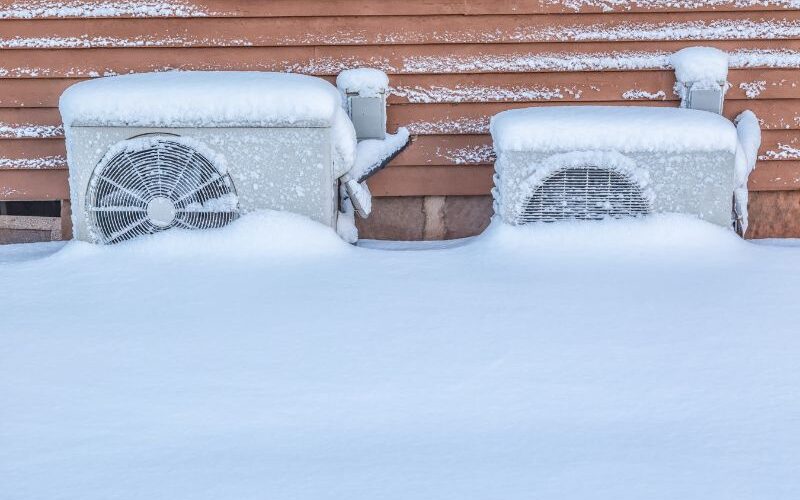
What happens when winter arrives and the temperature plummets?
Air source heat pumps have historically not performed well in cold climates and lose efficiency the colder it gets. But modern heat pumps are designed better with variable speed compressors inside them and more powerful sensors and processors to perform almost as well in winter temperatures.
Warmer weather is best for air source heat pumps and colder temperatures may reduce their efficiency. A lot of this is dependent on the type of heat pump you use.
Some heat pumps perform better in colder climates than others, The reason for this is that during the colder winter months, there is less warmth in the air and heat pumps with exposed piping have to work much harder to provide heat to your home than they would in the milder autumn weather.
Here we explain how heat pumps stay operational in cold weather when you should and shouldn’t be concerned, and what you can do to keep your heat pump from freezing during the winter months.
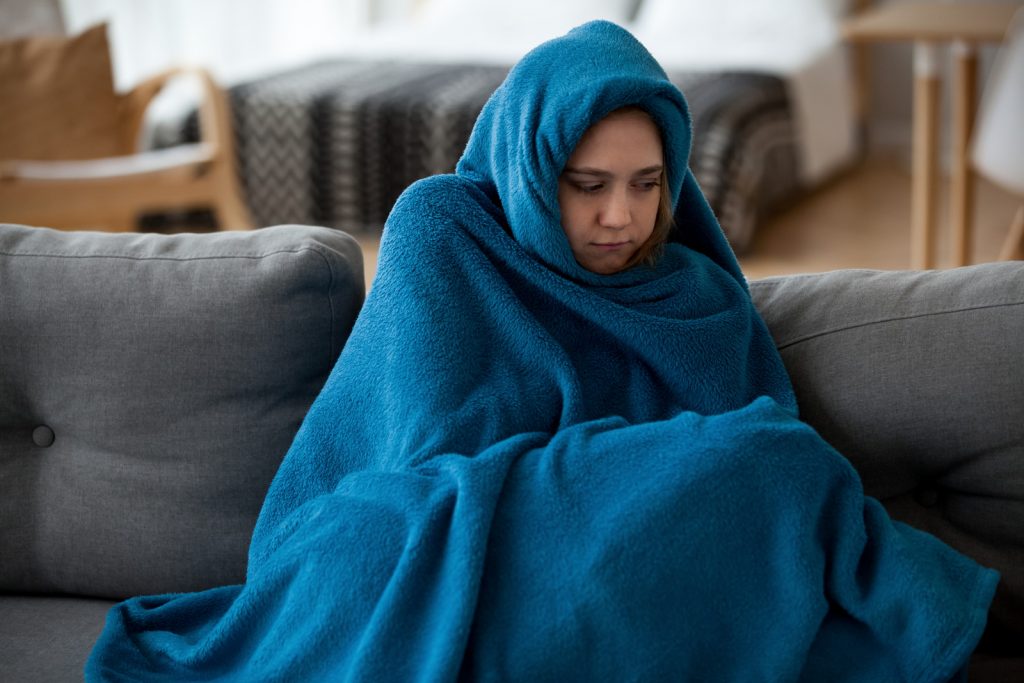
They continue to operate in winter weather
Air source heat pumps continue to operate even when temperatures drop below -20°C in most cases.
Warmth remains even when the temperature falls below freezing. In fact, warmth exists in air that is warmer than absolute zero because atoms and molecules continue to move through the air until that point, and air source heat pumps are able to absorb that warmth. This field study for the Energy Saving Trust highlights its effectiveness.
Heat pumps are typically designed to operate in outdoor temperatures ranging from -15C to -20C, but the model you choose must be powerful enough to keep your home warm. During the design stage, your house’s location and elevation above sea level must be considered.
A properly designed and commissioned installation should provide 100 percent of your heating and hot water needs, throughout the year, summer or winter.
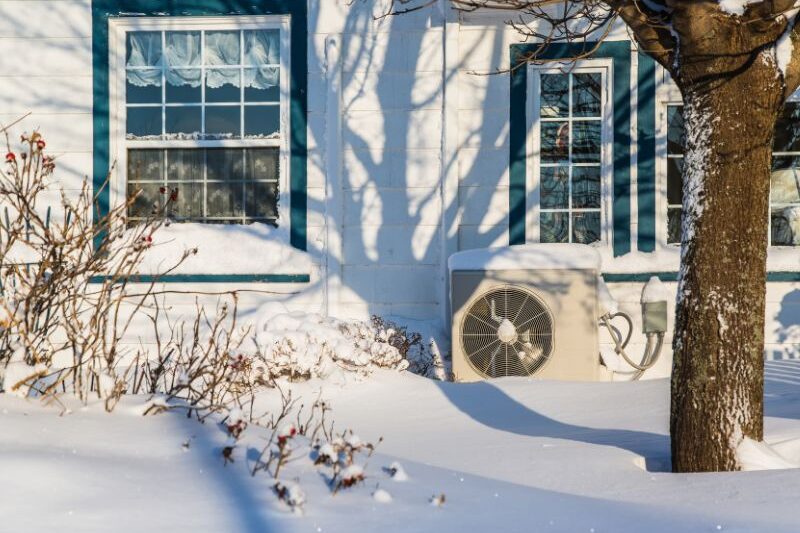
Can an air source heat pump work in cold weather?
Air source heat pumps typically lose efficiency as temperatures drop, as they must use more energy to extract warmth from the air. When there is less warmth in the air, this process requires more power.
But still, air source heat pumps manage to produce three units of heat for every unit of electricity used which is much better than a gas boiler can use gas. And the investment in this area is increasing, as well as new technology to improve heat pumps, as shown in this Unversity of Glasgow project.
When the temperature falls below zero, this rate drops to around two units – still roughly twice as much as a gas boiler will produce per unit of electricity.
Regular maintenance and the absence of exposed pipework can help your heat pump run more efficiently.
It is sometimes recommended for you to have a backup heating source available in case the outside temperature drops. This allows it to provide the remaining heat required when your air source heat pump’s efficiency begins to dip.
Do heat pumps work below 20 degrees?
Yes, air source heat pumps work well in temperatures below 20 degrees Fahrenheit. In fact, many will work even in temperatures that go down to 5 degrees Fahrenheit. This is around -15 degrees Celcius. you may need supplemental heating if the climate is constantly low but this is usually built into the heat pump.
Is it possible for your heat pump to freeze in the winter?
In the winter, your heat pump may freeze, but if this occurs, its defrost mode should automatically activate and stop the spread of ice through its system. If this does not occur, something has gone wrong.
Broken sensors, low refrigerant levels, or even leaves and other debris blocking the heat pump’s vents are all possible explanations.
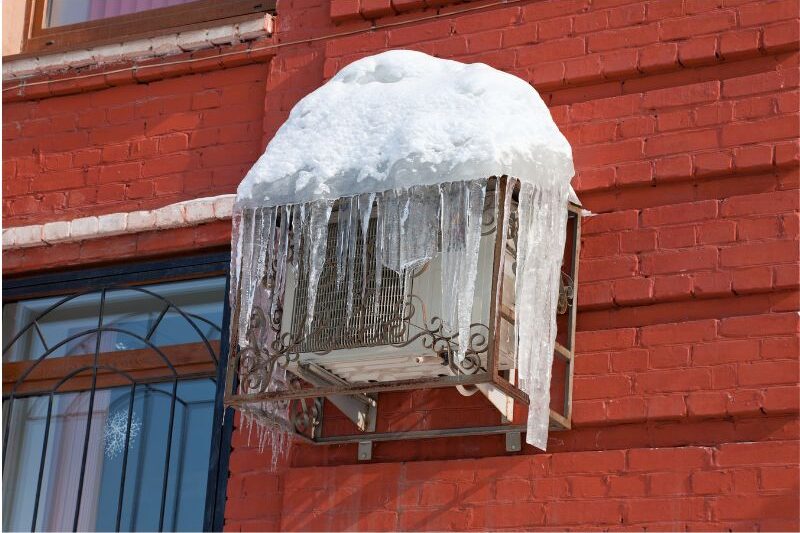
What happens when your heat pump freezes?
When it freezes, your air source heat pump should automatically enter defrost mode.
This means that the majority of its energy will be directed toward melting the ice that has formed in and around the piping. If this isn’t done automatically, check the owner’s manual to see if there’s a defrosting process you can start yourself.
In the event that this fails, contact the manufacturer of your heat pump and seek their advice. Do not attempt to repair the situation without seeking professional assistance.
In cold temperatures, your heat pump will not be as efficient as it would be in warmer temperatures. More electricity may be needed to remove heat from the air, resulting in lower efficiency.
The Coefficient of Performance is used to calculate heat pump efficiency (CoP). This is calculated by comparing the input and output amounts. The CoP of an air source heat pump, for example, is three if it uses one kW of electricity to produce three kW of heat. The higher the CoP value, the more efficient your heat pump is.
In severe cases, if your outdoor unit is covered in snow and ice, its ability to absorb heat from the outside air is severely limited. This will have a negative impact on how your heat pump system operates.
Your heat pump system may begin to fail if it is unable to absorb the necessary amount of heat from the outside air. You may notice that the temperature of the air entering your home is lukewarm.
You will also discover that your heat pump consumes far more energy than it should in order to heat your living spaces. If this continues, your heat pump system will malfunction and eventually fail.
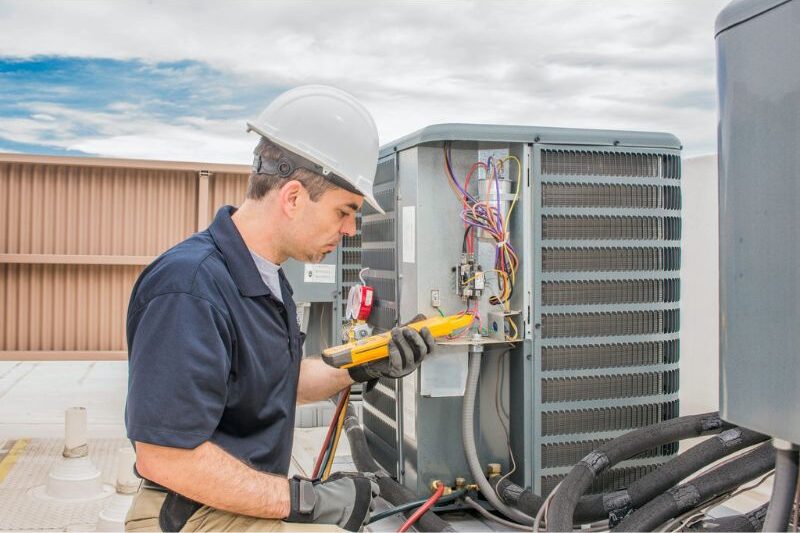
How to take care of your heat pump in winter
If you take care of your heat pump, it will last longer. You should have your system serviced ideally every 12 months.
This not only ensures that everything is running safely, but it also makes you feel better knowing that your heat pump will be able to keep your home warm throughout the winter.
Clear any debris from the area if you have an air source heat pump to keep the airflow from becoming clogged. This could reduce the efficiency of the heat pump.
You should also check the filter on a regular basis and replace it if necessary; any maintenance should be performed by a qualified engineer.
Even if the system is properly designed, your heat pump should be checked during periods of heavy snowfall or prolonged sub-zero temperatures to ensure that snow and ice do not accumulate around the fan or heat exchanger.
Should I cover my heat pump in the winter?
Heat pumps should not be covered when in use. This is because the fan needs to pull full airflow to operate efficiently. It is ok to cover the heat pump when you are away from home and heating and hot water won’t be required.
Read related articles
